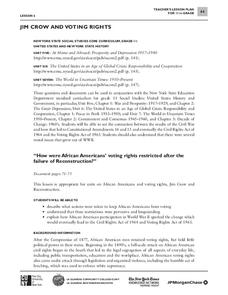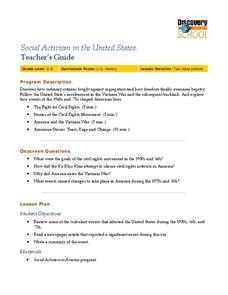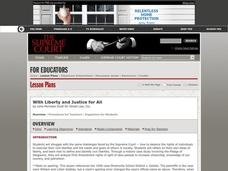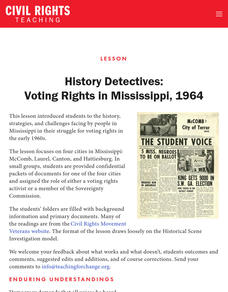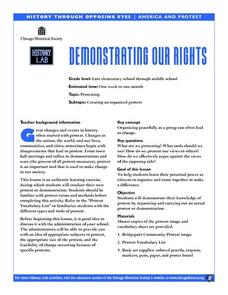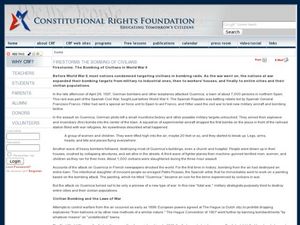Curated OER
Constitutional Issues: Civil Liberties During War
Students discuss democratic ideals and constitutional principles. They decide which side of the issue they are on dealing with the placement of Japanese-Americans in camps during World War II. They examine primary source documents for...
City University of New York
Jim Crow and Voting Rights
Class groups examine primary source documents to determine how the voting rights of African Americans were restricted after the failure of Reconstruction, and how African American participation in World War II lead to change.
Civil War Trust
Civil War Play
Raise the curtain to a class play that depicts the Civil War through both factual information and literary devices. The performance showcases the Battle of Antietam (Battle of Sharpsburg) and brings attention to women's roles,...
Civil War
Civil War Medicine: Fact or Fiction
Young historians compare the presentation of medical care during the Civil War in passages from fictional and nonfictional texts. They examine passages from Gone with the Wind by Margaret Mitchell and Soldier's...
Civil War Trust
Civil War Soldier: Experiencing the Battle of Franklin
Fighting a war over home soil makes a living nightmare even more real. Class members describe the experience of a Civil War soldier during the Battle of Franklin, poised right at a major turning point of the war, after researching the...
American Institute of Physics
The Physicist's War: Dr. Herman Branson and the Scientific Training of African Americans during World War II
The mobilization of soldiers for World War II resulted in a worker shortage in the defense industries, especially in the fields of physics and other sciences. The Engineering, Science, and Management War Training program (ESMWT) was...
Curated OER
Continuity or Change? African Americans in World War II
Students examine the experience of African Americans during World War II by analyzing primary sources and formulating historical questions. They evaluate if the African American experience during World War II represents continuity or...
Curated OER
Race and Voting in the Segregated South
High schoolers examine the history of African American voting rights. In this voting rights lesson, students listen to a lecture on African American voting rights between the years 1890 and 1965. High schoolers respond to discussion...
Curated OER
Women's Achievement Quiz
How much do you or your class know about various achievements made by women thorughout history? Here is a set of 10 questions with answers all related to the accomplishments of women in science, politics, civil rights, and law.
New York State Education Department
US History and Government Examination: January 2011
The presidencies of John F. Kennedy, Richard Nixon, and Ronald Reagan were defined by the Cold War. Using primary source documents and scaffolded analysis questions, pupils explore the effect the Cold War had on these presidencies. A...
Curated OER
Making a Case
Start the day by sharing opinions about human rights. Then, read "A Defiant Hussein Pleads Not Guilty to Mass Execution" with your middle and high school class. Your pupils research the specific charges in the case against Saddam...
Curated OER
The Civil War and Viet Nam are they Related?
Students identify and explain Civil Rights as they relate to the Civil War and Viet Nam eras. They explore civil rights through literature, artworks, news coverage, video and Internet sites. Students work in a group to develop a concept...
Curated OER
Social Activism in the United States
Seventh graders explore the goals of the Civil Rights Movement of the 1950s and 1960s. In this US History lesson plan, 7th graders read a newspaper article that reported a significant event during this era. Students write a...
Curated OER
With Liberty and Justice for All
High schoolers examine the role of Supreme Court justices. For this judicial branch lesson, students consider the civil rights and civil liberties as they investigate Minersville School District v. Gobitis (1940) and West Virginia State...
Curated OER
Letters from the Japanese American Internment
Students explore the concept of Japanese internment. In this Japanese internment activity, students examine primary sources that enable them to discover what internment camp life was like and its implications, Students write their...
University of California
The Civil War: Effects of the Civil War
Imagine being on the front line of the Civil War —from the front porch of your own house. Scholars use visual evidence from primary and secondary sources to analyze the impact of the Civil War on all Americans. They examine the research...
Teaching for Change
History Detectives: Voting Rights in Mississippi, 1964
Promises made and promise broken. Spies and activists. Voting rights in Mississippi are the focus of a lesson that has class members research the history of the struggle in Mississippi. Learners take on the role of voting rights...
Annenberg Foundation
Egalitarian America
What does a true American represent? Scholars investigate the equal rights era of the 1960s and 1970s in the 20th installment of a 22-part series on American history. Using photographic, magazine, written, and video evidence, groups...
Center for History Education
Japanese American Internment During World War II
World War II turned nations against each other and neighbors into enemies. An eye-opening lesson explores the dark past of Japanese-American internment camps during WWII. Scholars learn of the fear and distrust toward Asian Americans...
Curated OER
Demonstrating Our Rights
Students view image of Bridgeport Community Protest, discuss event depicted in image, and demonstrate knowledge of protest by organizing and carrying out an actual protest or demonstration.
Curated OER
Eisenhower: The Contentious 1950s
High schoolers explore 1950's America. In this American history lesson, students research the McCarthy hearings, Civil Rights, war fatigue, and economic issues of the decades. High schoolers respond to discussion questions about...
Curated OER
Firestorms: The Bombing of Civilians in World War II
Students examine the implication of civilian targets in war. In this World War II instructional activity, students investigate the history of bombing practices in war. Students zero in on World War II bombing practices as they discuss...
Curated OER
To Be Black and American: World War II
Twelfth graders research wartime conditions African American had to endure during World War II. They explain what role African Americans played in World War II and describe what life was like for African Americans in the United States...
Roy Rosenzweig Center for History and New Media
Reconstruction
When slavery ended, what did the government do to help African American during Reconstruction? An interesting instructional activity uses primary sources such as newspaper articles to help scholars analyze Reconstruction policies and how...

